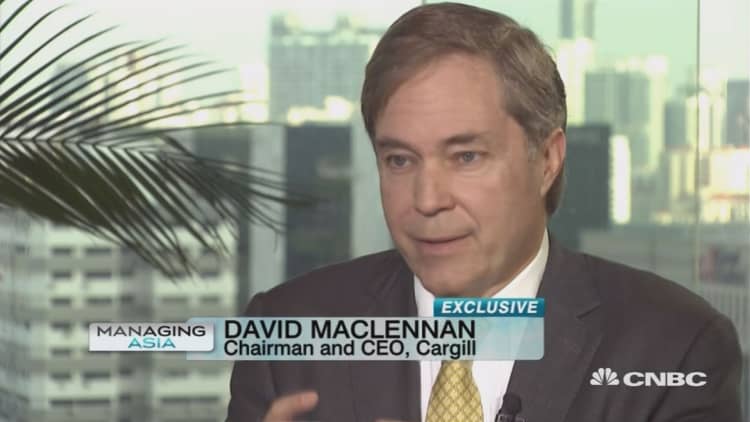
American agri-business Cargill has its sights set on moving up the food chain and focusing on the aquaculture and meat segments, with Asia expected to be a key market.
Since the company spent $1.5 billion acquiring Norwegian salmon-feed manufacturer EWOS in 2015, it has realigned its portfolio to focus on its core food production business, Cargill Chairman and CEO David MacLennan told CNBC's "Managing Asia."
"(T)he rate of growth of fish consumption in the world greatly exceeds pork consumption in the world. We see that trend and we're getting on it," MacLennan said.
MacLennan expressed interest in the prospects Asia offers, adding that Cargill has made recent investments in the region. Among them are a chocolate facility in Indonesia, feed mills in Vietnam and South Korea, and joint ventures in the chicken business in the Philippines and Indonesia, he said.
"We're always interested in Asia. I mean, what a great region it is in terms of … this is where the mouths are, the stomachs are. People are going to eat more and better food, so we've a lot of investments in Asia in the last couple of years," MacLennan said.
As for controversy surrounding genetically-modified food, Cargill is attempting to satisfy both ends of the spectrum by acknowledging the growing group of people against genetically-modified organisms (GMOs).

"It's a technical shift in your supply chain, but also an emotional shift. Meaning, acknowledging that there's people that believe GMOs are unhealthy. We don't agree with that: GMOs are a key tool for sustainability," MacLennan said.
"But nonetheless, there's a growing group of consumers that want to consume non-GMO containing foods," he acknowledged.
The company reportedly drew the ire of farmers after it was linked to the Non-GMO Project, a non-profit anti-GMO group. Cargill responded by reaching out to farmer groups to discuss how the company could better acknowledge how it remains in favor or GMOs.
"We don't believe in attacking GMOs as a technology. It's a valid and legitimate technology … At the same time, there are some consumers that don't want it," MacLennan said.
"I don't think the two have to be in conflict."



